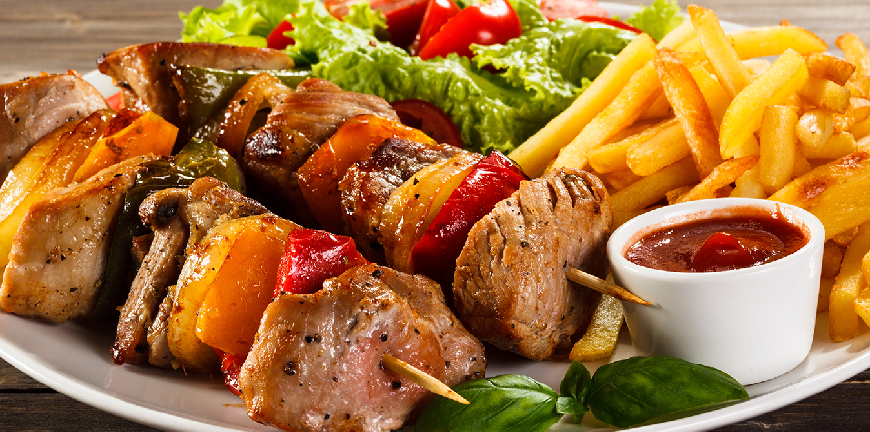Halal diet food refers to meals prepared and consumed in accordance with Islamic dietary laws (Halal) while also adhering to specific dietary goals like weight loss, muscle gain, or managing a health condition.
Here’s a breakdown of what that might involve:
- Halal Compliance: This is the foundation. All ingredients and processes must be permissible according to Islamic law. This means:
- No pork or pork products (gelatin, lard, etc.)
- No alcohol or products containing alcohol.
- Meat must come from permitted animals (e.g., cows, chickens, sheep) that have been slaughtered in a specific ritual manner (Zabiha).
- No blood or blood by-products.
- No cross-contamination with non-Halal items during preparation or storage.
- Dietary Goals: This is where the “diet” part comes in. A halal diet food plan can be tailored to specific needs:
- Weight Loss: Could involve calorie restriction, portion control, focusing on lean proteins, vegetables, and whole grains. Examples include grilled chicken salad, lentil soup, or baked fish with steamed vegetables.
- Muscle Gain: High protein intake from halal sources is crucial. Examples include halal-certified protein shakes, grilled chicken breast, lean beef, eggs, and beans.
- Diabetes Management: Focusing on low-glycemic index foods, controlling carbohydrate intake, and ensuring balanced meals. Examples include whole-grain bread with avocado, vegetable tagine, or grilled salmon with brown rice.
- Other Health Conditions: Dietary modifications based on the specific condition, always ensuring halal compliance.
- Examples of Halal Diet Foods:
- Proteins: Halal-certified chicken, beef, lamb, fish (salmon, tuna, cod, etc.), eggs, lentils, beans, tofu (if halal-certified processing).
- Carbohydrates: Whole grains (brown rice, quinoa, oats), vegetables, fruits.
- Fats: Olive oil, avocado, nuts, seeds (consumed in moderation).
- Snacks: Fruits, vegetables with hummus (halal certified), a handful of nuts, yogurt (halal certified).
- Meal Examples:
- Grilled chicken breast with roasted vegetables and quinoa.
- Lentil soup with whole-wheat bread.
- Salmon baked with lemon and herbs, served with brown rice and steamed broccoli.
- Vegetable curry with brown rice.
- Chickpea salad sandwich on whole-grain bread.
- Challenges:
- Finding Halal-Certified Products: It may require more effort to find halal-certified versions of certain ingredients (e.g., protein powder, gelatin-free desserts).
- Cross-Contamination Concerns: When eating out, ensuring that food is prepared in a halal-compliant environment can be challenging.
- Cost: Halal-certified products may sometimes be more expensive.
In short, a halal diet food plan combines the principles of Islamic dietary law with specific nutritional guidelines to achieve a desired health or fitness outcome. The key is to prioritize halal ingredients and preparation methods while tailoring the food choices to meet individual dietary needs.
Understanding the Core Principles of Halal Diet Food
The term “Halal” (حلال) is an Arabic word that translates to “permissible” or “lawful” in English. In the context of food, it refers to dietary standards prescribed in the Quran and the Sunnah (teachings and practices of Prophet Muhammad, peace be upon him). It’s more than just a set of rules; it’s a holistic approach to eating that emphasizes purity, hygiene, and ethical treatment of animals.
The foundational principle of Halal food is clearly stated in the Quran:
يَا أَيُّهَا النَّاسُ كُلُوا مِمَّا فِي الْأَرْضِ حَلَالًا طَيِّبًا وَلَا تَتَّبِعُوا خُطُوَاتِ الشَّيْطَانِ ۚ إِنَّهُ لَكُمْ عَدُوٌّ مُّبِينٌ “O mankind, eat from whatever is on earth [that is] lawful and good and do not follow the footsteps of Satan. Indeed, he is to you a clear enemy.” (Quran 2:168)
Key aspects of Halal diet food include:
- Prohibition of Haram (Forbidden) Items: This primarily includes pork and its by-products, alcohol and intoxicants, blood, carrion (animals that die of natural causes), and animals not slaughtered according to Islamic rites.
- Zabiha (Islamic Slaughter): For meat to be considered Halal, the animal must be slaughtered in a specific manner. This involves a swift, deep incision with a sharp knife to the throat, cutting the jugular veins, carotid arteries, and windpipe. The name of Allah (God) must be invoked during the slaughter. This method is designed to be humane, ensuring minimal suffering and complete drainage of blood.
- Purity and Wholesomeness (Tayyib): Beyond the permissibility (Halal), Islam encourages the consumption of “Tayyib” food, which means good, pure, wholesome, and nutritious. This emphasizes the quality and health benefits of the food consumed.
- Avoidance of Cross-Contamination: Strict measures must be taken to prevent Halal foods from coming into contact with Haram substances during preparation, processing, and storage.
The Multifaceted Benefits of a Halal Diet Food Plan
Opting for a Halal diet food plan offers a multitude of benefits that extend beyond religious observance, encompassing physical health, ethical considerations, and community well-being.
1. Enhanced Food Safety and Hygiene
The stringent requirements for Halal food preparation, particularly Zabiha slaughter, promote higher standards of hygiene. The complete drainage of blood from the animal reduces the risk of bacteria and toxin proliferation, leading to safer meat. Halal certification bodies often conduct rigorous inspections to ensure compliance with these standards throughout the supply chain.
2. Ethical Treatment of Animals
A core tenet of Islamic teachings is compassion towards all living beings. The Zabiha method, when performed correctly, aims to minimize animal suffering. The emphasis on humane treatment extends to how animals are raised – they should be provided with adequate food, water, and space, and not subjected to abuse or distress.
3. Focus on Wholesome and Natural Foods
The concept of “Tayyib” encourages the consumption of foods that are not only permissible but also good and pure. This naturally steers individuals towards fresh, unprocessed ingredients like fruits, vegetables, whole grains, and high-quality Halal meats. Such a diet is inherently rich in essential nutrients, vitamins, and minerals, contributing to overall health and vitality.
يَا أَيُّهَا الَّذِينَ آمَنُوا كُلُوا مِن طَيِّبَاتِ مَا رَزَقْنَاكُمْ وَاشْكُرُوا لِلَّهِ إِن كُنتُمْ إِيَّاهُ تَعْبُدُونَ “O you who have believed, eat from the good things which We have provided for you and be grateful to Allah if it is [indeed] Him that you worship.” (Quran 2:172)
4. Improved Metabolic Health
By excluding harmful substances like alcohol and certain additives often found in non-Halal processed foods, a Halal diet food plan can contribute to better metabolic health. The emphasis on lean proteins and fresh produce supports healthy digestion and can aid in weight management.
5. Spiritual and Mental Well-being
For Muslims, consuming Halal food is an act of obedience and worship, bringing a sense of peace and contentment. Knowing that one’s food intake aligns with divine guidance fosters spiritual well-being, which is intrinsically linked to mental and emotional health.
Practical Tips for Adopting and Maintaining a Halal Diet Food Lifestyle
Transitioning to or maintaining a Halal diet food lifestyle can be straightforward with a bit of planning and awareness. Circle H is here to guide you every step of the way.
1. Read Labels Carefully
When shopping for packaged foods, always check for Halal certification logos from reputable organizations. If a product isn’t certified, scrutinize the ingredient list for any Haram components (e.g., gelatin derived from pork, certain enzymes, alcohol-based flavorings). Be mindful of hidden ingredients.
2. Choose Reputable Halal Butchers and Suppliers
Source your meat and poultry from trusted Halal butchers or suppliers who can guarantee the authenticity of their Zabiha products. Don’t hesitate to ask about their certification and slaughtering processes. Circle H partners with certified providers to ensure the highest quality Halal diet food.
3. Explore Halal-Friendly Restaurants and Eateries
Many cities now boast a growing number of Halal-certified restaurants and takeaways. Look for clear Halal signage or inquire with the staff about their Halal status and food preparation methods. Apps and online directories can also be valuable resources for finding Halal dining options.
4. Cook More Meals at Home
Preparing your meals at home gives you complete control over the ingredients and cooking methods, ensuring your food is both Halal and Tayyib. This is also a great opportunity to explore diverse Halal cuisines from around the world. Circle H offers a variety of recipes to inspire your culinary adventures with Halal diet food.
- Experiment with traditional Middle Eastern, South Asian, and Southeast Asian dishes, which often feature inherently Halal ingredients.
- Focus on plant-based meals, which are generally Halal (ensure no cross-contamination with non-Halal items).
- Get creative with marinades and spices to enhance the flavor of your Halal meats and vegetables.
5. Educate Yourself and Your Family
Understanding the principles behind Halal food is crucial. Educate yourself and your family about what makes food Halal and Tayyib. This knowledge empowers you to make informed choices and appreciate the deeper significance of your dietary practices.
6. Plan Your Meals and Snacks
Meal planning can make adhering to a Halal diet food plan much easier, especially when you’re busy. Prepare a weekly menu, create shopping lists, and consider batch cooking some components to save time. Keep Halal snacks readily available to avoid reaching for non-Halal options when hunger strikes.
Some healthy Halal snack ideas include:
- Fresh fruits and vegetables
- Nuts and seeds (ensure they are not processed with Haram ingredients)
- Yogurt (check for Halal gelatin if present)
- Dates and figs
- Halal-certified energy bars or protein shakes
Common Misconceptions About Halal Diet Food
There are several misconceptions surrounding Halal food that can cause confusion. Let’s address a few common ones:
- “Halal food is only for Muslims.” While Halal food adheres to Islamic dietary guidelines, it is available for and consumed by people of all faiths and backgrounds who appreciate its emphasis on quality, hygiene, and ethical sourcing.
- “Halal food is just about how meat is slaughtered.” While Zabiha is a critical component, Halal encompasses the entire food production process, from farm to table, including the exclusion of Haram ingredients and prevention of cross-contamination. The concept of “Tayyib” (wholesome) is also integral.
- “All vegetarian food is automatically Halal.” Generally, plant-based foods are Halal. However, one must be cautious about additives, flavorings, or cross-contamination with non-Halal substances during processing or preparation (e.g., cheese made with animal rennet, or vegetables cooked in the same oil as pork).
Circle H: Your Partner in Embracing Halal Diet Food
At Circle H, we are committed to being your trusted resource for all things related to Halal diet food. We believe that everyone deserves access to food that is not only permissible and nourishing but also delicious and enjoyable. Our mission is to:
- Provide Accurate Information: We strive to offer clear, comprehensive, and up-to-date information on Halal dietary laws and practices.
- Promote Healthy Choices: We advocate for the “Tayyib” aspect of Halal, encouraging wholesome and nutritious eating habits.
- Support the Community: We aim to connect individuals with reliable Halal food sources, recipes, and educational materials.
- Champion Ethical Practices: We support suppliers and producers who adhere to the highest standards of Halal and ethical treatment of animals.
Choosing a Halal diet food plan is a fulfilling journey that nourishes the body, mind, and soul. It’s a conscious decision to consume food that is pure, ethical, and aligned with deeply held values. As you embark on or continue this path, remember that knowledge, awareness, and mindful choices are key. Circle H is here to support you with resources, guidance, and inspiration to make your Halal lifestyle both enriching and delicious.
Explore our website for more articles, Halal recipes, supplier directories, and tips on embracing the goodness of Halal diet food. Let Circle H be your companion in cultivating a healthier, more conscious way of eating.
فَكُلُوا مِمَّا رَزَقَكُمُ اللَّهُ حَلَالًا طَيِّبًا وَاشْكُرُوا نِعْمَتَ اللَّهِ إِن كُنتُمْ إِيَّاهُ تَعْبُدُونَ “So eat of what Allah has provided for you [which is] lawful and good. And be grateful for the favor of Allah, if it is [indeed] Him that you worship.” (Quran 16:114)
Disclaimer: While we strive for accuracy, always verify Halal certification and ingredients with manufacturers or suppliers directly, especially if you have specific dietary concerns or allergies. The information provided here is for educational purposes and should not be considered a substitute for professional dietary advice.


